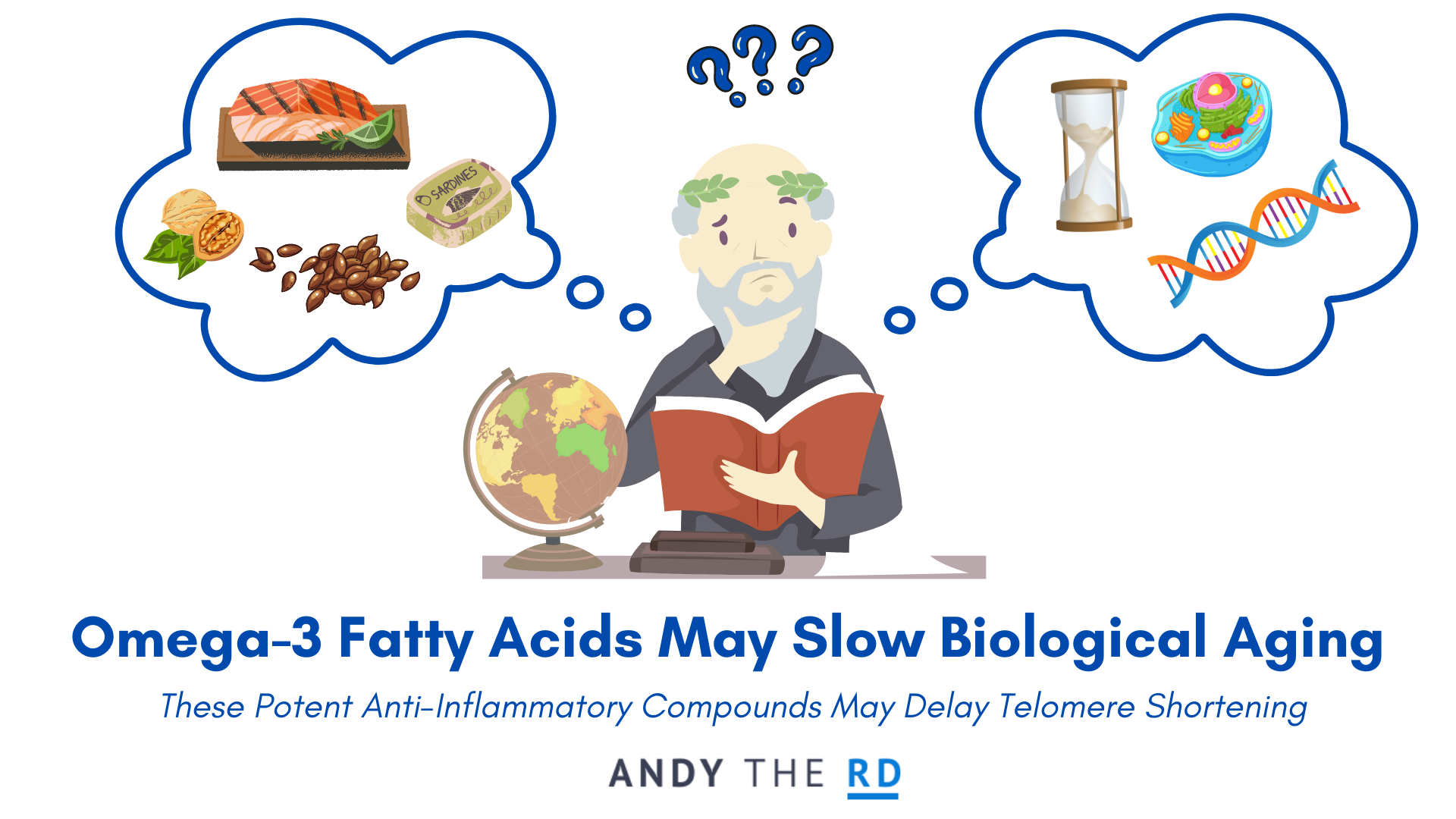Inflammageing is defined as an age-related increase in the levels of pro inflammatory markers in blood and tissues.
This is an overly scientific way of saying that bodily inflammation drives the aging process, and as a result there is potential for nutrients with anti-inflammatory capacity to slow the aging process.
Omega-3 fatty acids are known to be potently anti-inflammatory nutrients and have garnered interest in the anti-aging world for this, among other reasons.
Given my immense personal and professional interest in this area, I was thrilled when my writing volunteer Mashaal Junaid agreed to take on the task of working through this article with me.
You may recall some of our other pieces together including most recently on nutrition for the management and prevention of adult acne.
Today we’ve once again joined forces to look into whether or not Omega-3 fatty acids slow biological aging.
But how do scientists measure biological aging?
One way is to assess the length of cellular structures known as telomeres.
Let’s start by defining what those are and why they matter.
An Intro To Telomeres
Telomeres are DNA protein structures found at both ends of a chromosome.
A normal amount of telomere DNA is lost with each cell division, which contributes to the shortening of the telomeres over time.
When telomeres reach a critical length, in other words they become “too short”, the lifespan of a cell comes to an end.
Although it remains an imperfect science at this time, there has been a significant amount of interest generated around the notion that excessive or rapid telomere shortening is related to decreasing an organisms lifespan and with age-related diseases like heart disease, cancer and cognitive impairment.
Scientists consider telomere length as a meaningful indicator of a biological aging and have spent a great deal of time reviewing how human nutrition influences the telomere shortening process.
In fact, a 2021 paper out of Frontiers In Genetics had this to say about telomeres:
” [T]elomere length (TL) has been recognized for a long time as one of the best biomarkers of aging.”
It is also generally accepted that inflammation is a significant driver of telomere shortening, which really brings to life the Inflammeaging concept we mentioned at the outset.
But can nutrition meaningfully and measurably affect telomere shortening and are the potently anti-inflammatory omega-3s a candidate for such a benefit if so?
Let’s explore that next!
Omega 3s & Telomere Length – The Evidence
Omega-3 fatty acids are found primarily in fatty fish like salmon, sardines and trout as well as specific plant-based foods like flax, chia, walnuts and soy.
They may also be accessed in supplemental form.
In 2022, the Biomolecular Concepts journal published a meta-analysis including the results of five human controlled trials which demonstrated that omega-3 fatty acids may positively influence telomere length.
The results from this paper also align with the outcomes from another study published in 2022, this time out of the Nutrients journal which concluded that the majority of the best available evidence demonstrated that omega-3s have a positive influence on telomere length.
The researchers involved in the Nutrients study made a point to identify and reiterate that the current state of the evidence generally suggests that telomere shortening tends to be accelerated by inflammation.
While neither paper could offer truly conclusive findings due to a limited body of evidence, the scientific insights provided clearly point a positive direction.
More Evidence, Final Thoughts
Beyond the experimental data, we also have observational data from both the American Journal Of Clinical Nutrition and the Journal Of The American Medical Association to suggest that blood levels of DHA & EPA are associated with longer telomere length and slower telomere shortening.
Blood levels of DHA & EPA are related to our intake and exposure to those nutrients.
In order to provide some insights into the amount of these omega-3s that might be required to confer such a benefit, we can look to a 2014 study out of the Nutrition journal which found that a dosage of 1.5 grams of either DHA or EPA demonstrated the potential to meaningfully slow telomere shortening in older adults.
To put this into context, that is the amount of combined DHA/EPA in 3 oz of salmon and is also an amount that is accessible via both fish and algae-based supplements.
Definitive findings?
Far from it, but none the less intriguing and certainly noteworthy for those of us enamoured by this corner of the nutrition world.
A special thank you to Mashaal for her exceptional contributions to the research and writing of this piece.
Until next time,
Andy De Santis RD MPH
More Writing On Omega-3s, Anti-Aging
Omega-3s Help With Fatty Liver Disease [NAFLD] – Andy The RD
The Four Unique Nutrients That Slow Skin Aging – Andy The RD
People Who Live Longest Eat These 8 Foods More – Andy The RD
Mashaal’s Writing
Eating Disorders – What Should Caregivers Know? – Andy The RD



